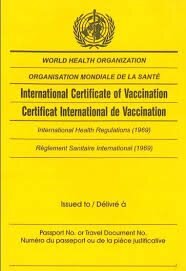Burner Devices, Bunny Suits, Biosecurity Clauses, and Blood Work
Up until February, I averaged 30 countries a year*. Some for 24 hours, some for a week, but either way, my work ordinarily takes me all over the world. With the lockdown, of course, all of that has been put on pause, and like most other people who work with ideas for a living, I'm typing and Zooming and pivoting my existing work and future contracts into new biosecure shapes. And so, like everyone else, I'm planning for an interesting future. It's clear that the digitization and post-geographisation of the consulting and advisory world has been hugely accelerated, and I think it's also clear that it's not going to go back to the old normal either. For sure, there is a considerable power in the sort of in-person meeting I would ordinarily do - whether in front of a single CEO, a 20 person board, or a 5000 person theatre - but that's not always going to be enough to, you know, ask people to possibly die for. And by the time the vaccines are ready and working, the cultures of business meetings will have changed.
But what of that change? What do business meetings look like in a world that has experienced a pandemic? It's a useful exercise to work through, because many of the same concepts are equally as relevant when we're considering the mitigation of other vectored risks: cybercrime, for example, or industrial espionage.
Here's what I'm thinking: Burner Devices, Bunny Suits, Biosecurity Clauses, and Blood Work. Ignoring for the moment the two-week quarantine that some countries are haphazardly imposing on some inbound travelers (because those will certainly go away sooner rather than later), it will most likely come down to individual companies to enforce their own particular rules.
Being granted access to a location-based headquarters, rather than just given a login to a virtual workplace, will depend on your own person being sufficiently and provably biosecure: blood test results showing a positive result for antigens, and a warm-zone changing area to put on tyvek PPE. Not to protect yourself, but to shield the staff community from your own personal viral shedding. Devices are filthy already, both microbiologically and with malware, so those can't come in. If you need a screen to operate, you'll get a blanked device to access the cloud with, VPN'd only, and isolated from the rest of the building. Masks, sure, or maybe the customer greeting rooms will be negatively pressured, and airlocked from the main building. Not just for Corona virus, or whatever the next one is, but for common flu and noro and all the other things we're now also mitigating while we work to avoid Covid19.

But perhaps the most like is the biosecurity clause. And this goes both ways: the right to pause, or cancel, a contract if one party believes the other to be endangering biosecurity. If I'm due to visit a client in their clean-room meeting facility, and I turn up and find no one is wearing a mask and that dude in the corner is coughing suspiciously, can I contract the right to walk away without loss? Or can my client enforce the reverse, where I arrive from Brooklyn, attempting to smuggle in some fomites and looking feverish?
UPDATE: The doyenne of workplace design, Alex Deschamps-Sonsino, has a great thread about post-Covid offices here.

